喜福会英文背景及人物赏析
英文版---喜福会影评
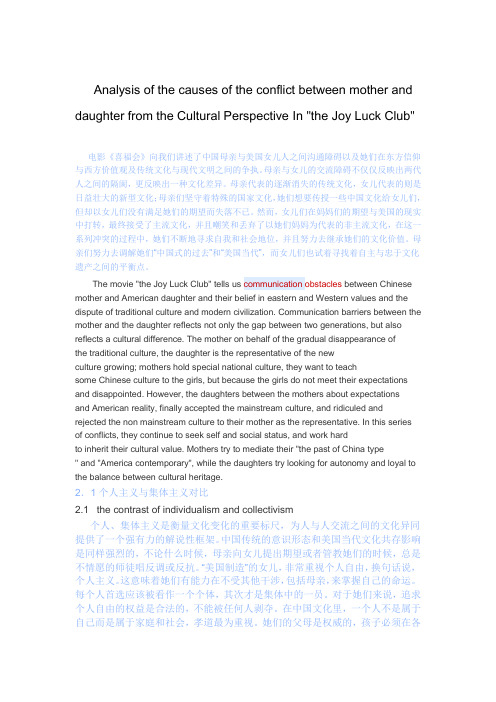
Analysis of the causes of the conflict between mother and daughter from the Cultural Perspective In "the Joy Luck Club"电影《喜福会》向我们讲述了中国母亲与美国女儿人之间沟通障碍以及她们在东方信仰与西方价值观及传统文化与现代文明之间的争执。
母亲与女儿的交流障碍不仅仅反映出两代人之间的隔阂,更反映出一种文化差异。
母亲代表的逐渐消失的传统文化,女儿代表的则是日益壮大的新型文化;母亲们坚守着特殊的国家文化,她们想要传授一些中国文化给女儿们,但却以女儿们没有满足她们的期望而失落不已。
然而,女儿们在妈妈们的期望与美国的现实中打转,最终接受了主流文化,并且嘲笑和丢弃了以她们妈妈为代表的非主流文化,在这一系列冲突的过程中,她们不断地寻求自我和社会地位,并且努力去继承她们的文化价值。
母亲们努力去调解她们“中国式的过去”和“美国当代”,而女儿们也试着寻找着自主与忠于文化遗产之间的平衡点。
The movie "the Joy Luck Club" tells us communication obstacles between Chinese mother and American daughter and their belief in eastern and Western values and the dispute of traditional culture and modern civilization. Communication barriers between the mother and the daughter reflects not only the gap between two generations, but also reflects a cultural difference. The mother on behalf of the gradual disappearance ofthe traditional culture, the daughter is the representative of the newculture growing; mothers hold special national culture, they want to teachsome Chinese culture to the girls, but because the girls do not meet their expectations and disappointed. However, the daughters between the mothers about expectationsand American reality, finally accepted the mainstream culture, and ridiculed andrejected the non mainstream culture to their mother as the representative. In this seriesof conflicts, they continue to seek self and social status, and work hardto inherit their cultural value. Mothers try to mediate their "the past of China type" and "America contemporary", while the daughters try looking for autonomy and loyal to the balance between cultural heritage.2.1个人主义与集体主义对比2.1 the contrast of individualism and collectivism个人、集体主义是衡量文化变化的重要标尺,为人与人交流之间的文化异同提供了一个强有力的解说性框架。
喜福会英文观后感ReviewsonTheJoyLuckClub——电影《喜福会》英文影评、观后感
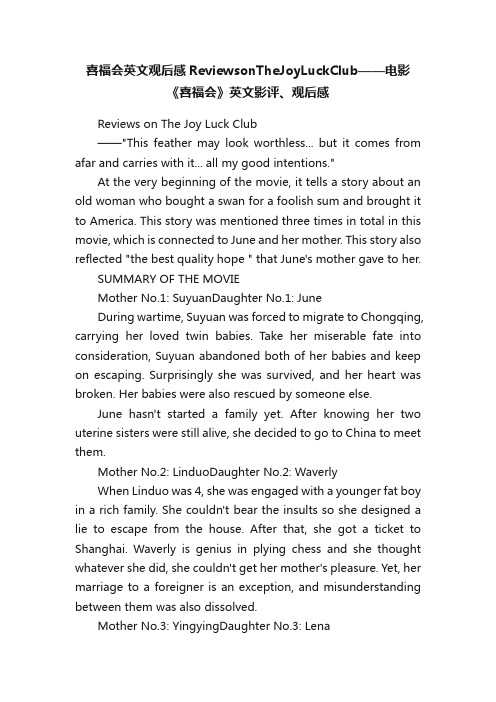
喜福会英文观后感ReviewsonTheJoyLuckClub——电影《喜福会》英文影评、观后感Reviews on The Joy Luck Club——"This feather may look worthless... but it comes from afar and carries with it... all my good intentions."At the very beginning of the movie, it tells a story about an old woman who bought a swan for a foolish sum and brought it to America. This story was mentioned three times in total in this movie, which is connected to June and her mother. This story also reflected "the best quality hope " that June's mother gave to her.SUMMARY OF THE MOVIEMother No.1: SuyuanDaughter No.1: JuneDuring wartime, Suyuan was forced to migrate to Chongqing, carrying her loved twin babies. Take her miserable fate into consideration, Suyuan abandoned both of her babies and keep on escaping. Surprisingly she was survived, and her heart was broken. Her babies were also rescued by someone else.June hasn't started a family yet. After knowing her two uterine sisters were still alive, she decided to go to China to meet them.Mother No.2: LinduoDaughter No.2: WaverlyWhen Linduo was 4, she was engaged with a younger fat boy in a rich family. She couldn't bear the insults so she designed a lie to escape from the house. After that, she got a ticket to Shanghai. Waverly is genius in plying chess and she thought whatever she did, she couldn't get her mother's pleasure. Yet, her marriage to a foreigner is an exception, and misunderstanding between them was also dissolved.Mother No.3: YingyingDaughter No.3: LenaWhen Yingying was 16, she fall in love with a very handsome man and became pregnant before they got married. Their marriage was a failure, and she had no choice but kill her baby in order to "take away the only thing that she shears with her polygamous husband.Lena also had an unsuccessful marriage, she and her husband count every bill in completely detail, they take "fifty-fifty" policy. After being enlightened by her mother, she knew what to do.Mother No.4: AnmeiDaughter No.4: RoseAnmei's mother was raped by a man of wealth and was forced to be the man's fourth wife. Although her family members didn't trust her explains and evicted her from the house, she still loves her old ill mother and cut her own flesh to cure her dying mother.Rose got married with a boss owing a big wine chateau, however, all things she had done to her husband didn't pay off ---her husband's dishonesty drove their marriage to breakdown even had had a lovely daughter.Suyuan, Linduo, Yingying and Anmei, those four Chinese woman's story is the highlight of the movie. They were all insulted and maltreated by Chinese old feudalism in the old society. In order to lead a happy life, they moved to America to build up a new family. Thankfully, their daughters' life are not too bad as theirs and they speak fluent American English.The movie presents the four daughters' personal life, and then lead us to the four ladies' gloomy experience skillfully. Playing mahjong, reading the letter and gathering at the banquet are also the dispensable parts.There are a few points that impressed me:Firstly—the story behind the swan feather. The feather is an embodiment of the hope that Suyan delivered to June, and the hope also represented June' two twin sister. Secondly—fluent American English spoken by those several old Chinese woman and their yellow skin daughters. Fluent American English represented that the four ladies has live in America for many years and they have been accustomed to the American lifestyle. Thirdly—layouts in the four ladies' house and the garments they four wear. There are many antique stuffs with Chinese style scattering in the house. The clothes were also typical in Chinese style.At the end of the movie, June met her two twin sisters, she told them that their mother had already dead, and they burst into tears, simultaneously, so do I.The four ladies migrated from China to America, and brought their cultural background to there anddelivered it to their daughters. It was their mothers' tough experience that taught the girls to learn to be strong and excellent in their own life.(All the contents are written by myself, not derive from the Internet)四川农业大学英语系周记民2016.6.26。
女性主义经典之作《喜福会》

女性主义经典之作《喜福会》前两天,一位其貌不扬的中年阿姨火了。
说到原因则是她的一场“逃离”,一场对于婚姻和家庭的逃离。
在过去的三十年里,这位苏姓阿姨一直和自己的丈夫貌合神离,生活的费用和开销也是AA制。
“我甚至连对沙发的使用权也没有!”视频里苏阿姨云淡风轻地语气难掩深深的落寞之情。
她在那辆自己购买的小汽车上,微笑地对大家说:“我发这个视频就是想唤醒那些和我一样的中国女性,要走自己的路,为自己活一次!”朴素直白的语言,却一下子戳中了无数中年女人的泪点,也同时让那些被生活里的琐碎消磨到浑浑噩噩的女人们警醒:作为女人我们究竟应该怎么样活着?如果你想弄清这个问题,我建议你翻翻《喜福会》(The Joy Luke Club)。
作为华裔小说家谭恩美的处女作,《喜福会》一经面市,便造成了巨大的轰动,斩获各类大奖,成为经久不衰的畅销书。
在书中,谭恩美通过塑造一个个饱满的女性形象,不仅表现出了母女之间的深情,也以母亲的悲惨命运和女儿们的不幸婚姻为切入点,讲述了她们如何遭受男权社会的压迫以及走向反抗的过程,逐步让读者明白:女性寻找自我的过程,是异常艰辛的,但是即便如此,我们仍然不能放弃,不能认命,应当让世界听到我们的声音,即使微弱,也是一种力量!1九岁那年,许安梅再次见到了自己的母亲,尽管此时,她在安梅的眼中形同陌路,但是她仍认出了她,安梅说:“我知道她就是我的母亲,因为我能感受到她的痛苦。
”在母亲离开的那些年里,她对于母亲所有的印象来自于外婆,那个生养了母亲的女人。
“永远都不要提你母亲的名字。
说她的名字无异于往你父亲的坟头啐了一口。
”安梅的母亲出现的时候,外婆已经提不起力气来骂她了,因为她已经病入膏肓。
她就这样出现在外婆面前,舅母用恶毒的话咒骂她,她不回嘴;舅舅抽了她一个耳光,她也只是把头低得更深了。
多年前,因为守寡失节,嫁给了有钱人做小老婆,母亲早已被这个家族驱逐。
即使她早已不被家族承认,当外婆病重时,作为女儿她仍顶着巨大的压力和漫天的谩骂回到母亲身边,用一种最极端的方式进行最后一次忏悔——“母亲在自己的手臂上割下一片肉,眼泪从她的脸上淌下,血,也搭啦搭啦地滴在地板上。
中西文化差异视角下《喜福会》翻译与赏析

中西文化差异视角下《喜福会》翻译与赏析作者:邓珊珊来源:《青年文学家》2015年第14期摘要:以美国华裔女作家谭恩美的代表作《喜福会》为代表的亚裔文学一直是展现中西文化差异的平台。
然而长久以来对亚裔文学中表现的中西方文化差异研究主要集中在文学领域,翻译界却较少。
本文以《喜福会》的翻译版本为例,从《喜福会》及其作者简介出发,分析中西方文化的差异,继而从翻译的角度进一步表现中西方文化的差异。
关键词:中西方文化差异;《喜福会》;翻译作者简介:邓珊珊(1982-),女,籍贯:河北省石家庄市,单位:河北中医学院讲师,在读硕士研究生,研究方向:英美语言文学。
[中图分类号]:H315.9 [文献标识码]:A[文章编号]:1002-2139(2015)-14-0-01一、中西方文化差异分析(一)风俗文化的差异在世界各国,由于每个国家发展的背景和历史不同,就造成了每个国家形成了他们各自独特的民族风俗文化,另外,文化的形成不是一朝一夕就形成的,而是历经几代甚至几十代人的不断积累和继承形成的,这也反映了文化本身继承性和发扬性的特点。
正是由于每个国家民族文化的不同,因此,各国文化在相互交流和翻译的过程中就出现了一些差异。
举例来说,在中国每当过年时,我们要贴红色的春联,穿红色的一幅,不仅代表喜庆,也代表着我们对即将到来的新一年的美好祝福;但是在国外,红色仅仅代表着颜色的一种,并没有其他的特殊含义,这就体现了两者在这方面的文化差异。
总体而言,从民族风俗文化上无不体现着中西方的差异。
(二)思维方式的差异早在古代时期,孔子孟子就提出了影响我国人们做人做事及思维方式的思想,即:中庸之道。
可以说,在我国五千年的发展脉络中,“中庸之道”一直贯穿其中,它指导着中国人无论在说什么做什么都主张一种不偏不坡的方法,既不追求突出自己,也不使得自己落后于众人之后,既不会使得自己过于显眼,也不至于使得自己得罪他人。
但是在国外人看来,中国的这种“中庸之道”却是他们极其不能理解的。
《喜福会》评析
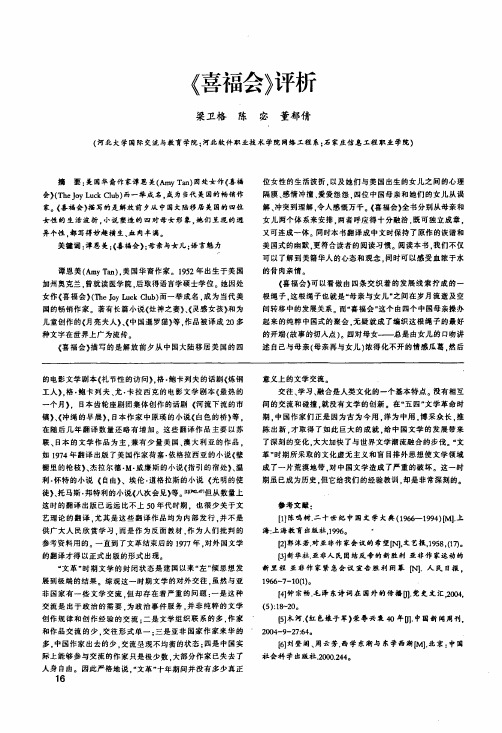
(河北大学国际交流与教育学院;河北软件职业技术学院网络工程系;石家庄信息工程职业学院)摘要:美国华裔作家谭恩美(A m yT an)因处士作《喜福会}(The l oyLu c kC I ub)而一举成名.成为当代美国的畅销作家。
《喜福会》描写的是解放前夕从中国大陆移居美国的四位女性的生活波折.小说塑造的四对母女形象,她们呈现的迥异个性.都写得妙趣横生、血肉丰满。
关键词:谭恩美;《喜福会>;母亲与女儿;语言魅力谭恩美(A m y Tan)。
美国华裔作家。
1952年出生于美国加州奥克兰.曾就读医学院.后取得语言学硕士学位。
她因处女作《喜福会)(The JoyLuckC l ub)而一举成名,成为当代美国的畅销作家。
著有长篇小说《灶神之妻》、《灵感女孩》和为儿童创作的《月亮夫人》、《中国暹罗猫》等,作品被译成20多种文字在世界上广为流传。
《喜福会》描写的是解放前夕从中国大陆移居美国的四位女性的生活波折.以及她们与美国出生的女儿之同的心理隔膜、感情冲撞、爱爱怨怨.四位中国母亲和她们的女儿从误解、冲突到理解,令人感慨万千。
<喜福会》全书分别从母亲和女儿两个体系来安排。
两者呼应得十分融洽,既可独立成章,又可连成一体。
同时本书翻译成中文时保持了原作的诙谐和美国式的幽默,更符合读者的阅读习惯。
阅读本书。
我们不仅可以了解到美籍华人的心态和观念.同时可以感受血浓于水的骨肉亲情。
<喜福会》可以看做由四条交织着的发展线索拧成的一根绳子.这根绳子也就是“母亲与女儿”之间在岁月流逝及空间转移中的发展关系。
而。
喜福会”这个由四个中国母亲操办起来的纯粹中国式的聚会.无疑就成了编织这根绳子的最好的开端(故事的切入点)。
四对母女——总是由女儿的口吻讲述自己与母亲(母亲再与女儿)浓得化不开的情感瓜葛。
然后的电影文学剧本《礼节性的访问》,格.鲍卡列夫的话剧《炼钢工人》,格鲍卡列夫、尤.卡拉西克的电影文学剧本《最热的一个月’.日本齿轮座剧团集体创作的话剧《河流下流的市镇>、《冲绳的早晨》,日本作家中原瑛的小说《白色的桥》等,在随后几年翻译数量还略有增加。
two kinds景梅的人物性格分析
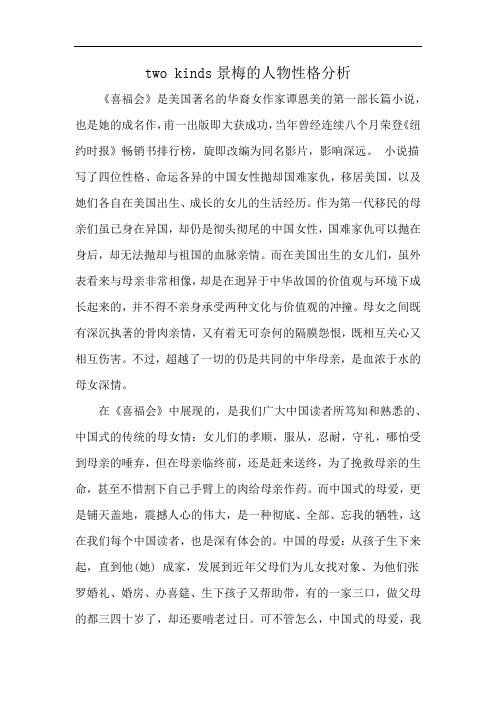
two kinds景梅的人物性格分析《喜福会》是美国著名的华裔女作家谭恩美的第一部长篇小说,也是她的成名作,甫一出版即大获成功,当年曾经连续八个月荣登《纽约时报》畅销书排行榜,旋即改编为同名影片,影响深远。
小说描写了四位性格、命运各异的中国女性抛却国难家仇,移居美国,以及她们各自在美国出生、成长的女儿的生活经历。
作为第一代移民的母亲们虽已身在异国,却仍是彻头彻尾的中国女性,国难家仇可以抛在身后,却无法抛却与祖国的血脉亲情。
而在美国出生的女儿们,虽外表看来与母亲非常相像,却是在迥异于中华故国的价值观与环境下成长起来的,并不得不亲身承受两种文化与价值观的冲撞。
母女之间既有深沉执著的骨肉亲情,又有着无可奈何的隔膜怨恨,既相互关心又相互伤害。
不过,超越了一切的仍是共同的中华母亲,是血浓于水的母女深情。
在《喜福会》中展现的,是我们广大中国读者所笃知和熟悉的、中国式的传统的母女情:女儿们的孝顺,服从,忍耐,守礼,哪怕受到母亲的唾弃,但在母亲临终前,还是赶来送终,为了挽救母亲的生命,甚至不惜割下自己手臂上的肉给母亲作药。
而中国式的母爱,更是铺天盖地,震撼人心的伟大,是一种彻底、全部、忘我的牺牲,这在我们每个中国读者,也是深有体会的。
中国的母爱:从孩子生下来起,直到他(她) 成家,发展到近年父母们为儿女找对象、为他们张罗婚礼、婚房、办喜筵、生下孩子又帮助带,有的一家三口,做父母的都三四十岁了,却还要啃老过日。
可不管怎么,中国式的母爱,我以为是世上罕见的一种牺牲,她们之所以心甘情愿这样,是因为她们的母亲,母亲的母亲,就是这么一代一代过来的。
可那些美国女儿们:虽然也是黑头发黄皮肤,其中有一位已经有一半的白人血液,但她们生在美国,长在美国,是由“可口可乐和意大利面喂大的”。
她们不懂,或者只能讲不能读中文,也不了解中国,把“太原”错听成“台湾”,她们确是地地道道的美国人了。
这些美国女儿也笃爱着自己的母亲,却不能忍受她们中国母亲的铺天盖地、无孔不入的母爱。
喜福会 The Joy luck club 剧情和影评(英文)
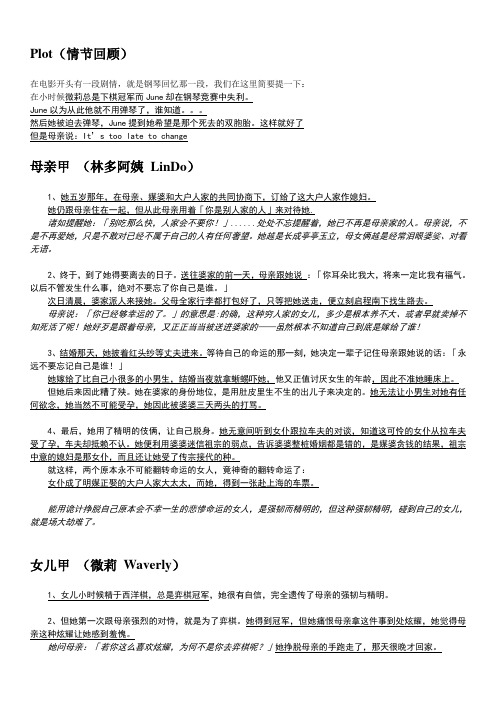
Plot(情节回顾)在电影开头有一段剧情,就是钢琴回忆那一段,我们在这里简要提一下:在小时候微莉总是下棋冠军而June却在钢琴竞赛中失利。
June以为从此他就不用弹琴了,谁知道。
然后她被迫去弹琴,June提到她希望是那个死去的双胞胎。
这样就好了但是母亲说:It’s too late to change母亲甲(林多阿姨LinDo)1、她五岁那年,在母亲、媒婆和大户人家的共同协商下,订给了这大户人家作媳妇。
她仍跟母亲住在一起,但从此母亲用着「你是别人家的人」来对待她.诸如提醒她:「别吃那么快,人家会不要你!」......处处不忘提醒着,她已不再是母亲家的人。
母亲说,不是不再爱她,只是不敢对已经不属于自己的人有任何奢望。
她越是长成亭亭玉立,母女俩越是经常泪眼婆娑、对看无语。
2、终于,到了她得要离去的日子。
送往婆家的前一天,母亲跟她说:「你耳朵比我大,将来一定比我有福气。
以后不管发生什么事,绝对不要忘了你自己是谁。
」次日清晨,婆家派人来接她。
父母全家行李都打包好了,只等把她送走,便立刻启程南下找生路去。
母亲说:「你已经够幸运的了。
」的意思是:的确,这种穷人家的女儿,多少是根本养不大、或者早就卖掉不知死活了呢!她好歹是跟着母亲,又正正当当被送进婆家的——虽然根本不知道自己到底是嫁给了谁!3、结婚那天,她披着红头纱等丈夫进来。
等待自己的命运的那一刻,她决定一辈子记住母亲跟她说的话:「永远不要忘记自己是谁!」她嫁给了比自己小很多的小男生,结婚当夜就拿蜥蜴吓她,他又正值讨厌女生的年龄,因此不准她睡床上。
但她后来因此糟了殃。
她在婆家的身份地位,是用肚皮里生不生的出儿子来决定的。
她无法让小男生对她有任何欲念,她当然不可能受孕,她因此被婆婆三天两头的打骂。
4、最后,她用了精明的伎俩,让自己脱身。
她无意间听到女仆跟拉车夫的对谈,知道这可怜的女仆从拉车夫受了孕,车夫却抵赖不认。
她便利用婆婆迷信祖宗的弱点,告诉婆婆整桩婚姻都是错的,是媒婆贪钱的结果,祖宗中意的媳妇是那女仆,而且还让她受了传宗接代的种。
解读电影《喜福会》中的女性形象
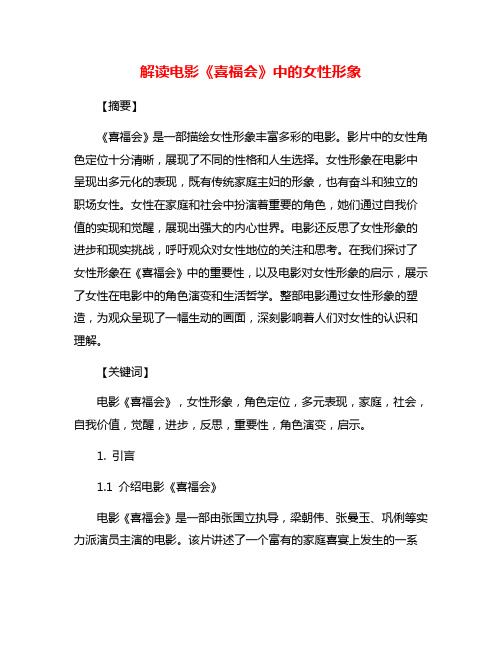
解读电影《喜福会》中的女性形象【摘要】《喜福会》是一部描绘女性形象丰富多彩的电影。
影片中的女性角色定位十分清晰,展现了不同的性格和人生选择。
女性形象在电影中呈现出多元化的表现,既有传统家庭主妇的形象,也有奋斗和独立的职场女性。
女性在家庭和社会中扮演着重要的角色,她们通过自我价值的实现和觉醒,展现出强大的内心世界。
电影还反思了女性形象的进步和现实挑战,呼吁观众对女性地位的关注和思考。
在我们探讨了女性形象在《喜福会》中的重要性,以及电影对女性形象的启示,展示了女性在电影中的角色演变和生活哲学。
整部电影通过女性形象的塑造,为观众呈现了一幅生动的画面,深刻影响着人们对女性的认识和理解。
【关键词】电影《喜福会》,女性形象,角色定位,多元表现,家庭,社会,自我价值,觉醒,进步,反思,重要性,角色演变,启示。
1. 引言1.1 介绍电影《喜福会》电影《喜福会》是一部由张国立执导,梁朝伟、张曼玉、巩俐等实力派演员主演的电影。
该片讲述了一个富有的家庭喜宴上发生的一系列故事,揭示了家族关系、权力斗争和人性的复杂性。
电影以其独特的叙事手法和深刻的人物塑造赢得了观众的好评。
《喜福会》以家庭为背景,通过不同女性角色的塑造展现了女性在家庭和社会中的多面性和复杂性。
影片中的女性形象丰富多彩,有传统的贤内助,也有独立自主的职业女性,她们各自展现了不同的人生态度和价值取向。
影片对女性的自我认知和觉醒也给观众留下了深刻的印象。
在电影《喜福会》中,女性形象的塑造不仅体现了电影的情节发展,更反映了当时社会对女性角色的认知和固有观念。
通过解读电影中女性形象的多重表现,我们可以更深入地理解电影中的人物关系以及故事情节的发展。
1.2 提出解读女性形象的重要性解读女性形象在电影《喜福会》中的重要性是非常必要的。
女性在社会中扮演着重要的角色,她们的形象不仅仅是为了衬托男主角的英雄形象,更是展现出女性在家庭和社会中的多样性和力量。
电影是一种艺术形式,它可以通过女性形象的表现来传递社会的价值观念和思想观念。
- 1、下载文档前请自行甄别文档内容的完整性,平台不提供额外的编辑、内容补充、找答案等附加服务。
- 2、"仅部分预览"的文档,不可在线预览部分如存在完整性等问题,可反馈申请退款(可完整预览的文档不适用该条件!)。
- 3、如文档侵犯您的权益,请联系客服反馈,我们会尽快为您处理(人工客服工作时间:9:00-18:30)。
The Joy Luck Club (1989) is a best-selling novel written by Amy Tan. It focuses on four Chinese American immigrant families in San Francisco, California who start a club known as "the Joy Luck Club," playing the Chinese game of mahjong for money while feasting on a variety of foods. The book is structured somewhat like a mahjong game, with four parts divided into four sections to create sixteen chapters. The three mothers and four daughters (one mother, Suyuan Woo, dies before the novel opens) share stories about their lives in the form of vignettes. Each part is preceded by a parable relating to the game.In 1993, the novel was adapted into a feature film directed by Wayne Wang and starring Ming-Na, Lauren Tom, Tamlyn Tomita, France Nguyen, Rosalind Chao, Kieu Chinh, Tsai Chin, Lisa Lu, and Vivian Wu. The screenplay was written by the author Amy Tan along with Ronald Bass. The novel was also adapted into a play, by Susan Kim, which premiered at Pan Asian Repertory Theatre in New York.CharactersMothersSuyuan WooDuring the Second World War, Suyuan lives in China while her husband at the time served as an officer in Chungking (Chongqing). She starts the original Joy Luck Club with her three friends to cope with the war. There is little to eat, but they pretend it is a feast, and talk about their hopes for the future. On the day of the Japanese invasion, Suyuan leaves her house with nothing but a bag of clothes, a bag of food, and her twin baby daughters.During the long journey, Suyuan contracts such severe dysentery that she feels certain she will die. Fearing that a dead mother would doom her babies' chances of rescue, she reluctantly and emotionally leaves her daughters under a barren tree, together with all her belongings, along with a note asking anyone who might find the babies to care for them and contact the father. Suyuan then departs, expecting to die. However, she is rescued by a truck and finds out her husband has died. She later remarries, comes to America, forms a new Joy Luck Club with three other Chinese female immigrants she met at church, and gives birth to another daughter. But her abandonment of the twin girls haunts her for the rest of her life. After many years, Suyuan learns that the twins were adopted, but dies of a brain aneurysm before she can meet them. It is her American-born daughter Jing-mei who fulfills her long-cherished wish of reuniting with her elder twin half-sisters.As Suyuan dies before the novel begins, her history is told by Jing-mei, based on her knowledge of her mother's stories, anecdotes from her father, and what the other members of the Joy Luck Club tell her.An-Mei HsuAn-Mei is raised by her grandparents and other relatives during her early years in Ningbo after her widowed mother shocks the family by becoming a concubine to a middle-aged wealthy man after her first husband's death. This becomes a source of conflict for the young An-Mei, as her aunts and uncles deeply resent her mother for such a dishonorable act. They try to convince An-Mei that it is not fitting for her to live with her disgraced mother, who is now forbidden to enter the family home. An-Mei's mother, however, still wishes to be part of her daughter's life. After An-Mei's grandmother dies, An-mei moves out to live with her mother in the home of her mother's new husband, Wu-Tsing.An-Mei learns that her mother was coerced into being Wu-Tsing's concubine through the manipulations of his Second Wife, the favorite. This woman arranged for An-Mei's mother, still in mourning for her original husband, to be raped by Wu-Tsing. The stigma left An-Mei's mother withno choice but to marry Wu-Tsing and become his new but lowly Fourth Wife. She later lost her baby son to Second Wife, who claimed the boy as her own child to ensure her place in the household. Second Wife also tried to win over An-mei upon her arrival in Wu-Tsing's mansion, giving her a necklace made of "pearls" that her mother later revealed were actually glass beads by crushing one with her teacup. An-Mei's mother re-knots the necklace to hide the missing bead, but now An-Mei knows the truth about Second Wife's seeming generosity.Wu-Tsing is a highly superstitious man, and Second Wife takes advantage of this weakness by making false suicide attempts and threatening to haunt him as a ghost if he does not let her have her way. According to Chinese tradition, a person's soul comes back after three days to settle scores with the living. Wu-Tsing, therefore, is known to be afraid to face the ghost of an angry or scorned wife. After Second Wife fakes a suicide attempt to prevent An-Mei and her mother from getting their own small house, An-Mei's mother successfully commits suicide herself, eating tangyuan laced with lethal amounts of opium. She times her death so that her soul is due to return on the first day of the new year, a day when all debts must be settled lest the debtor suffer great misfortune. With this in mind, Wu-Tsing promises to treat his Fourth Wife's children, including An-Mei, as if they were his very own flesh and blood by an honored First Wife. When Second Wife attempts to disrupt this, An-Mei crushes the fake pearl necklace Second Wife gave her beneath her feet to show her awareness of all Second Wife's deception and to symbolize her new power over Second Wife, who now fears her and realizes the bad karma she has brought upon herself.An-Mei later immigrates to America, marries, and gives birth to seven children (four sons, three daughters). The youngest, a son named Bing, drowns at age four.Lindo JongLindo is a strong-willed woman, a trait that her daughter Waverly attributes to her having been born in the year of the Horse. When Lindo was only twelve, she was forced to move in with a neighbor's young son, Huang Tyan-yu, through the machinations of the village matchmaker. After some training for household duties through her in-laws, she and Tyan-yu married when she turned sixteen. She soon realized that her husband was just a little boy at heart and had no sexual interest in her. Lindo began to care for her husband as a brother, but her cruel mother-in-law expected Lindo to produce a grandson. She restricted most of Lindo's daily activities, eventually ordering her to remain on bed rest until she could conceive and deliver a child.Determined to escape this unfortunate situation, Lindo carefully observed the other people in the household and eventually formed a clever plan to escape her marriage without dishonoring herself or her family. She managed to trick her young husband's family into believing that he was actually fated to marry another girl who was already pregnant with his "spiritual child", and that her marriage to Huang Tyan Yu would only bring bad luck to the family. In reality, the girl in question was a mere servant in the household and indeed pregnant, but abandoned by her lover.Freed from her first marriage, Lindo decided to emigrate to America. She married a Chinese-American man named Tin Jong and has three children: sons Winston and Vincent, and daughter Waverly.Lindo experiences regret over losing some of her Chinese identity by living so long in America (she is treated like a tourist on a visit to China); however, she expresses concern that Waverly's American upbringing has formed a barrier between them.Ying-Ying "Betty" St. ClairFrom a young age, Ying-Ying is told by her wealthy and conservative family that Chinese girls should be meek and gentle. This is especially difficult for her, she feels, because she is a Tiger character. She begins to develop a passive personality and repress her feelings as she grows up in Wuxi. Ying-Ying marries a charismatic man named Lin Xiao, not out of love, but because she believed it was her fate. Her husband is revealed to be abusive and openly has extramaritalrelationships with other women. When Ying-Ying discovers she is pregnant, she gets an abortion and makes the decision to live with her relatives in a smaller city in China.After ten years, she moves to Shanghai and works in a clothing store, where she meets an American man named Clifford St. Clair. He falls in love with her, but Ying-Ying cannot express any strong emotion after her first marriage. He courts her for four years before she agrees to marry him after learning that Lin Xiao had died, which she takes as the proper sign to move on. She allows Clifford to control most aspects of her life, mistranslating her words and actions, and even changing her name to "Betty". Ying-Ying gives birth to her daughter, Lena, after moving to San Francisco with St. Clair. When Lena is around ten years old, Ying-Ying becomes pregnant a third time, but the baby boy is anencephalic and soon dies.Ying-Ying is horrified when she realizes that Lena, a Tiger like herself, has inherited or emulated her passive behaviors and trapped herself in a loveless marriage with a controlling husband. She finally resolves to call upon the more assertive qualities of her Tiger nature, to appeal to those qualities in Lena. She will tell Lena her story in the hope that she will be able to break free from the same passivity that ruined most of her young life back in China.DaughtersJing-Mei "June" WooJing-Mei has never fully understood her mother and seems directionless in life. During June's childhood, her mother used to tell her that she could be anything she wants; however, she particularly wanted her daughter to be gifted, a child star who amazes the world, like Ginny Tiu (seen briefly on television) or June's rival Waverly. At the beginning of the novel, June is chosen to replace her mother's seat in the Joy Luck Club after her mother's death. At the end of the novel, June is still trying to deal with her mother's death, and she visits China to see the twin half-sisters (Wang Chwun Yu and Wang Chwung Hwa) whom her mother had been forced to abandon when the Japanese attacked China.One critic[who?] has suggested[1] that the reason for the communication gap between Jing-Mei and her mother, and between the other daughters and their mothers—a major theme of the novel—occurs because the mothers come from a high context culture and the Americanized daughters from a low context culture. The mothers believe that the daughters will intuitively understand their cryptic utterances, but the daughters don't understand them at all.Rose Hsu JordanRose is somewhat passive and is a bit of a perfectionist. She had an unsettling childhood experience when her youngest brother, Bing, drowned while she was supposed to be watching him, and his body was never recovered. Rose marries a doctor, Ted Jordan, who loves her but also wants to spite his snooty, racist mother. After a malpractice suit, Ted has a mid-life crisis and decides to leave Rose. Rose confides in her mother and An-mei tells her the story of her own childhood. When Ted comes for the divorce papers, Rose finds her voice and tells him that he can't just throw her out of his life, comparing herself to his garden, once so beloved, now unkempt and full of weeds. An-Mei tells her that Ted has been cheating on her, which Rose thinks is absurd, but she later discovers this to be true. She wants to hire a good lawyer and fight for possession of the house, which she eventually wins.Waverly JongWaverly is an independent-minded and intelligent woman, but is annoyed by her mother's constant criticism. Well into her adult life, she finds herself restrained by her subconscious fear of letting her mother down. During their childhood, June and Waverly become childhood rivals; their mothers constantly compared their daughter's development and accomplishments. Waverly was once a gifted chess champion, but quit after feeling that her mother was using her daughter's talent to show off,taking credit for Waverly's wins. She has a daughter, Shoshana, from her first marriage with Marvin, and is currently engaged to her boyfriend Rich Shields.Lena St. ClairThroughout Lena's childhood, she gradually becomes her mother's voice and interprets her mother's Chinese words for others. Like her father Clifford, she translates Ying-ying's words to sound more pleasant than what Ying-ying actually says. Ying-ying has taught Lena to beware of consequences, to the extent that Lena visualizes disaster in the taking of any risk. Lena's husband, Harold, is also her boss. He takes the credit for Lena's business and design ideas. He demands financial "equality" in their marriage. Lena is an associate while Harold is a partner, so he has a larger salary than she does. However, he insists that all household expenses be divided equally between them. Harold believes that by making everything equal, they can make their love equal as well. Lena feels frustrated and powerless.Table of contentsFeathers from a Thousand Li Away"The Joy Luck Club," Jing-mei "June" Woo"Scar," An-Mei Hsu"The Red Candle," Lindo Jong"The Moon Lady," Ying-Ying St ClairThe Twenty-Six Malignant Gates"Rules of the Game," Waverly Jong"The V oice from the Wall," Lena St. Clair"Half and Half," Rose Hsu Jordan"Two Kinds," Jing-mei "June" WooAmerican Translation"Rice Husband," Lena St. Clair"Four Directions," Waverly Jong"Without Wood," Rose Hsu Jordan"Best Quality," Jing-mei "June" WooQueen Mother of the Western Skies"Magpies," An-mei Hsu"Waiting Between the Trees," Ying-Ying St. Clair"Double Face," Lindo Jong"A Pair of Tickets," Jing-mei "June" WooCriticismThough Amy Tan's book has been widely praised by critics, it has also been alleged by Chinese-American author Frank Chin that it perpetuates racist stereotypes.[2][3][4] Chinese-American director Wayne Wang was impressed with the story and created a film version of the novel.[5]References^ CUNY Brooklyn article^ Come All Ye Asian American Writers of the Real and the Fake^ The Joy Luck Club^ Review: The Joy Luck Club^ "Asian images in film spotlight - The Joy Luck Club". Turner Classic Movies. Retrieved 3 July 2008.。
